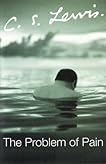I love books that you can stew in, and C.S. Lewis writes stewing-in-books. Now, you can certainly zip through the Chronicles of Narnia and his other works of fiction, but even his novels have depth and complexity in which you can bathe, if you so are inclined. Yes, it's true that the writing style is a becoming more archaic by the day, and his references are not ones that necessarily make sense to your average middle class American girl born in 1985, however "bookish" she may claim to be. Still, I like books that make me sit up straight. That is, between Harry Potter
But, perhaps best of all, C.S. Lewis seems to be a "picker." You know what I'm talking about, one of those people who can't leave things alone. He picks and picks at ideas, especially his own, until he is satisfied that they are structurally sound. As previously mentioned, I'm given to bunny trails, so it especially nice for me that C.S. Lewis provides such a sturdy structure for me to play on.
Shall I demonstrate?
 The Problem of Pain by C.S. Lewis
The Problem of Pain by C.S. LewisMy rating: 4 of 5 stars
The heart, soul, brain, and feet of this book are wrapped up in this premise:
“If God were good, he would wish to make his creatures perfectly happy, and if God were almighty he would be able to do what he wished. But the creatures are not happy. Therefore God lacks either the goodness, or power, or both”.
This equation is the center of The Problem of Pain. Rather than skip ahead to more abstract philosophies about suffering, he asks the question that you, me, and Joe High-School-Education have all asked, and he stays there. Equally commendable, h e doesn't tell the reader why he shouldn't be asking this question. He doesn't say, "God's ways are not our ways" (one of the most frustrating and least comforting a Christian can say to someone experiencing pain). No, like any good Picker, he picks.
As he pokes and prods these issues, Lewis makes a few suggestions and observations that make the "God = good = happy people" equation break down. He does this in 10 chapters:
Introductory
Divine Omnipotence
Divine Goodness
Human Wickedness
The Fall of Man
Human Pain
Human Pain, continued
Hell
Animal Pain
Heaven
Lewis takes 15 page in the "Introductory" chapter to explain that this "Problem" of pain would be no problem at all if God or some divine standard didn't exist. This may not seem all that revolutionary, but it is important to understand the assumptions we make about pain and its existence in the world. As a complex, thinking life form, we have some sense that somehow the bad things ought not happen. Even those who do not believe in any kind of higher power sense that pain and suffering, in at least a few cases, is an injustice. But Lewis will explain in further chapters that pain, especially physical pain, is not inherently a bad thing, it is actually a survival mechanism. Pain, he posits, tells us that something is wrong. If we did not experience pain then we would have no concept that anything was wrong with this world.
The following chapters examine the terms within the "If God were good" equation: 'good', 'almighty' and 'happy,' and then placing them next to examples within the bible along with observable principles and relationships within the world in order to ask the reader what we really understand to be true about these ideas. Often, our assumptions about what is 'good,' etc., is not so simple, especially when we consider that we do not live in a vacuum.
Co-existence of freely-willed people requires pain. You and I exist within the same limited space, it cannot accommodate the absolute fulfillment of all things. That is to say, the resources (food, warmth, shelter, society, success) the guarantee happiness are limited and shared among all creatures. It makes me wonder if it would be possible to creative entirely homeostatic, symbiotic relationship between every organism, bacteria to human. I suppose God could have created a system wherein each organism's existence was independent of any other, but such an idea is bizarre when we look at our world.
God create a world where creatures were designed to have relationship, friend, lover, father, master, owner, mentor or servant. Each of our actions directly affects a host of other creatures, even causing pain. No interdependent world can be pain free, so no free-willed organism within an interdependent system can be utterly satisfied, or 'happy'. The idea negates itself and can't exist.
Now this is just a small sample of the arguments and ideas presented in this book. To be sure, it is not the end of the discussion on pain. But it is an important addition to that argument. More than that, it causes you to think, which is important.
These are not simple issues and they reach deep into the heart of who we are and especially our relationship with a god that is, supposedly, good. For that reason I highly recommend reading C.S. Lewis's The Problem of Pain.
View all my reviews

No comments:
Post a Comment